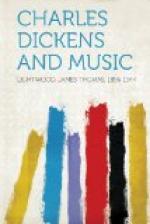Mr. Kidson says in reference to this: ’I do not know that it was ever written to music, though I fancy more than one popular tune has been set to the words, which are by a person named Pitt.’
AULD LANG SYNE (’Holly Tree,’ D.C. 17, 28)
Words by Burns.
A version of the melody occurs at the end of the overture to Shield’s Rosina, 1783, and is either his own composition or an imitation of some Scotch melody. As, however, such melody has not hitherto been discovered, no great importance can be attached to this theory. Rosina was performed in Edinburgh.
Some maintain that the tune is taken from a Scotch reel known as the ‘Miller’s Wedding,’ found in Bremner’s Reels (1757-1761).
AWAY WITH MELANCHOLY (O.C.S. 58, O.M.F. ii. 6, P.P. 44, D.C. 8)
The melody is from Mozart’s Magic Flute, ’Das klinget so herrlich’—a chorus with glockenspiel accompaniment. The writer of the words is unknown.
The air was introduced into an arrangement of Shakespeare’s Tempest, and set to the words ‘To moments so delighting!’ sung by Miss Stephens. Also found as a duet ’composed by Sigr. Mozart, arranged by F.A. Hyde.’
BAY OF BISCAY (U.T. 31, D. & S. 39, P.P. 32)
Words by Andrew Cherry. J. Davy.
Also see under ‘A Frog He Would.’
BEETHOVEN’S SONATA IN B.
See p. 28.
BEGONE, DULL CARE (O.C.S. 7, E.D. 2)
Author unknown. The words occur in various song-books of the eighteenth century. The tune is seventeenth century, possibly derived from the ‘Queen’s Jigg’ in the Dancing Master.
Begone, dull care, I prithee
begone from me;
Begone, dull care, you and
I can never agree.
The words were set as a glee by John Sale, and this may be the music that Dickens knew.
BELIEVE ME, IF ALL JARLEY’S WAXWORKS SO RARE (O.C.S. 27)
A parody on the following.
BELIEVE ME, IF ALL THOSE ENDEARING YOUNG CHARMS (B.H. 55)
Words by T. Moore.
Set to the old melody ‘My Lodging is on the Cold Ground.’ This appears to have come into existence about the middle of the eighteenth century. It is found in Vocal Music, or the Songster’s Companion, 1775, and it was claimed by Moore to be an Irish melody, but some authorities deny this. It has also been claimed as Scotch, but the balance of opinion is in favour of its English origin (F. Kidson).




